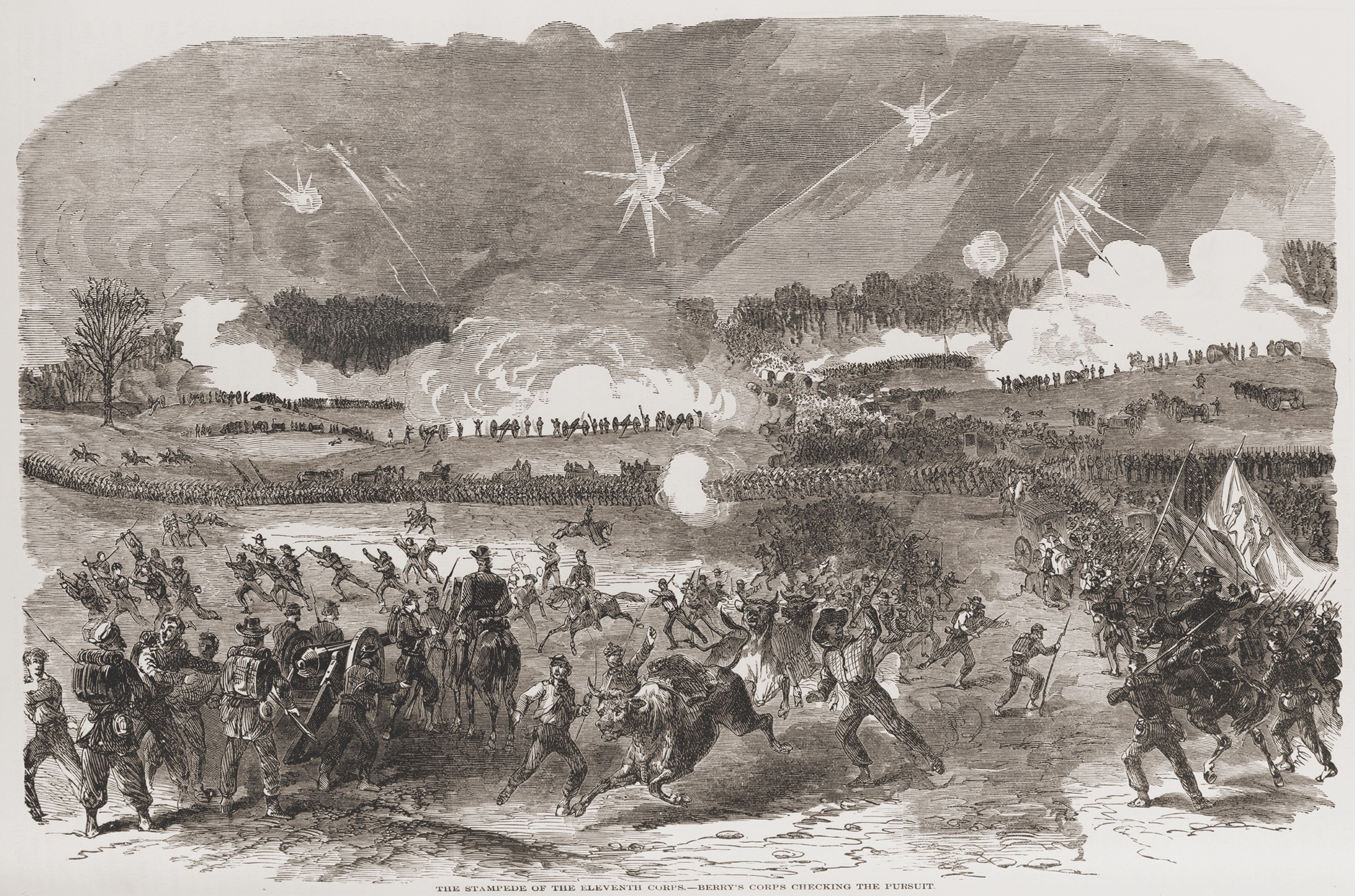
While Brian Matthew Jordan, assistant professor and chair of history at Sam Houston State University, worked on an essay about the court-martial of the colonel of the 107th Ohio Volunteer Infantry, he grew curious about this little-known unit, one of only six Union regiments composed primarily of foreign-born ethnic Germans. The men left little in the way of diaries and letters, so Jordan combed through a variety of other sources to piece together the first detailed history of the regiment, which survived being decimated at both Chancellorsville and Gettysburg. The 107th’s story is at the core of his latest book, A Thousand May Fall: Life, Death, and Survival in the Union Army.
CWT: What sparked your interest in the regiment?
BMJ: The 107th Ohio Volunteer Infantry was mustered from a dozen Ohio counties during the summer and fall of 1862. Seventy percent were ethnic Germans, and some said they wanted to join a unit where they could speak their language. German soldiers were hardly unknown in the Union armies, some 200,000 ethnic Germans would fight between 1861 and 1865, but units where foreign-born soldiers outnumbered native-born were pretty rare. About 10 years ago, scholars were beginning to explore the regimental history as a tool for telling a more complete and capacious narrative of the Civil War. I thought the 107th would be a unique way to get into the human and emotional topography of the war.
CWT: They entered the war with minimal training?
BMJ: The training amounted to about three weeks, much of that was done without muskets, and muskets that were issued were poorly functioning, of Austrian manufacture. Many soldiers went to the front not knowing how to load or fire. Officers are reading the tactical manual alongside the men. These soldier volunteers’ naïve notions are very quickly dashed.
CWT: What happened when they went to battle?
BMJ: Chancellorsville is their baptismal fire. They were in the 11th Corps under Oliver Howard, deployed into the extreme Union right during that battle. They were dangerously overextended, dangling in the air. That situation is exploited by Stonewall Jackson’s 26,000 Rebel soldiers, and the 107th Ohio is one of the first units to be hit in Stonewall Jackson’s flank attack. They make a brief stand at the Talley Farm on the Orange Turnpike. One soldier writes that they fired but three rounds. About 220 are killed, wounded, missing, or captured, and many hauled off to Libby Prison in Richmond. Their first outing had north of a 50 percent casualty rate, and there is also quite a lot of evidence in the regimental order books of what some soldiers would call nervous fever.
CWT: Yet they went on to fight at Gettysburg.
BMJ: Almost exactly two months later, they are deployed to the exact same position, on the extreme right of an overextended Union flank under a new army commander, pushed forward to brace a beleaguered Union brigade at Blocher’s Knoll, a deadly perch to which they arguably should never have been assigned. The unit suffers another 211 casualties on that first afternoon of July, and makes a tangled retreat through the borough of Gettysburg. The regimental adjutant made a desperate attempt to rally the broken regiments at the old Adams County Courthouse. Although 458 went in, just 171 will limp into position on Cemetery Hill that evening. After being thrashed for the second time in as many battles, they go at it again on July 2 and remarkably perform pretty well against the Louisiana Tigers, capturing the colors of the 8th Louisiana Regiment, an often-overlooked role in securing the anchor of the Union fishhook at Gettysburg.
CWT: Despite these casualties, many of the unit’s soldiers reenlisted, and 60 percent voted for McClellan in the 1864 election.
BMJ: One of the things I wanted to drive home in the book is that we so often think of soldiers in linear ways. We like a single trajectory: they either become wholly disillusioned or they become abolitionized. For the men of the 107th Ohio, it moves back and forth based on where they are, based on their experiences, based on their physical environments. By the 1864 election, they are out of the Army of the Potomac, operating in Florida on the most remote margins of the war. They feel they are contributing nothing to the war effort. They want it to be over. That vote for McClellan demonstrates that we should resist generalizations about Civil War soldiers and their motivations.
CWT: Where did they go after Gettysburg?
BMJ: In August 1863, they are transferred to Folly Island, just outside of Charleston. It is mostly occupation on the siege line. It is boring and numbing. The regimental order books say men are refusing to fold their gum blankets, polish their muskets, shine their shoes. They feel they have been badly handled. This is a particular burden for an ethnic regiment in a nativist 19th-century society. They long for a chance to prove themselves in combat and it won’t be forthcoming in Florida. Their big opportunity is right at the end of the war in a little known rail-twisting raid into the heart of the Palmetto State, Potter’s Raid, to destroy as much rolling stock as possible as Sherman is driving north into the Carolinas. They get one more opportunity. They go at the Rebels and they acquit themselves very well. One of their members earns the Medal of Honor, yet that is completely eclipsed. The engagement in South Carolina occurred on Sunday, April 9, 1865, at the very moment that Lee was surrendering to Grant. The last opportunity they had to move from the heartbreak side of the ledger to the heroic side came right as attention is appropriately elsewhere.
CWT: Did anything really surprise you in unearthing this unit’s history?
BMJ: We often get the view that years and decades after the war, these men looked back nostalgically and contributed in some ways to the sanitization of the war. They wanted to polish everything up and recount their heroism. This is the opposite. They want to tell their story as a historic pageant of woe and wanted to believe they had a monopoly on misfortune. That was important because that sense of suffering is a way of showing they were willing to sacrifice for all—unfortunately they had to prove themselves as foreign-born men.
CWT: Was the paucity of records the reason for a lack of an existing history of the 107th Ohio?
BMJ: Scarcity of sources, yes; the regiment is written up in 1863 for poor recordkeeping. There is also the ethnic question. Even popular Civil War audiences are shocked to realize that a quarter of the Union Army are foreign-born soldiers. We know about the Irish Brigade. I think very few people would understand that more than 200,000 ethnic Germans fight in the Union Army. There are 180,000 African Americans. Almost as many Irish. We haven’t always amplified the full range of voices. Maybe it is because of our own prejudices and biases. We have always wanted to tell a story of the Civil War that is triumphal and heroic. This is none of that. In the last few decades we’ve seen threads come together: digital tools that allow us to access sources more expeditiously; the desire to amplify voices historically marginalized, and in many corners of Civil War scholarship a desire to tell a story that maybe doesn’t end triumphally and is more unflinchingly honest and, dare I say, human.
Interview conducted by Senior Editor Sarah Richardson.
[hr]
Thank you for visiting historynet.com. If you buy something through our site, we might earn a commission.





